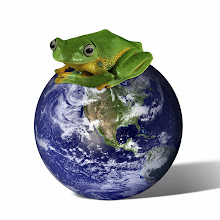The history of a place is not painted in one broad brush-stroke of color, is almost never the tale of one people arriving and adapting in some empty, virgin land. Few if any peoples can truly say they have always been in the place they now call home. (Some fancy word that I cannot now remember describes such a phenomenon -- I want to say ichthyonous or erechthonous or something.)
Most often, the pigments of history blend together: Britons, Angles and Saxons clashing and then finally melding, in the British Isles; Arabs and Copts forming the modern nation of Egypt.
Other times, the colors never meet on the canvas. How much history passed away in the Americas, how many peoples rose and fell from the Aleutians to Patagonia, before ever Christopher Columbus' boot pressed into the New World sand! Some experts are beginning to think that what most of the early Europeans saw in the New World was just a shadow of what had been -- a once vast and teeming multitude of peoples almost totally annihilated by European diseases, within just a few decades.
Tonight I have begun to read the next author in my chronological project: the Roman historian Tacitus. He begins his Annals of Roman History with a brief mention of Augustus Caesar, then of Tiberius and a mutiny in Pannonia.
That caught my attention. Pannonia was the northeast border of the Empire, the land that is today called Hungary. It intrigues me to think of those Roman troops, in their tents, in that land, scheming and cussing and playing dice, doing whatever it is that soldiers do, seven hundred years before Magyars ever rode out of Eurasia to settle in that beautiful place.
The Romans were long gone by then. The two peoples drank from the same Danube (relatively speaking), ascended the same hills, perhaps even sought shade under some of the same venerable old trees, but never knew each other and never met.
Today, now and then, Hungarians still dig up buried Roman coins, and of course, in Budapest are the famous ruins of Aquincum, a Roman settlement.
It's just intriguing to me.
Thursday, June 19, 2008
Colors of time
Subscribe to:
Post Comments (Atom)
















3 comments:
The history of people and places is intriguing. Since change is the one constant you can rely on it makes sense that most countries have a deep and varied history of conquerors. Even great empires like the Roman Empire finally fall and in recent centuries the crown of the world's mightiest power has passed hands too.
The only word I know for those whose people have always lived in a place is "indigenous," which is not very arcane. when you think of the right one, I hope you'll post it.
I have always been fascinated by archaeological digs because of the layers of civilizations on top of one another, the concrete evidence that the world has always been here and will continue to be long after we and all the societies on earth at this time are gone.
I find this oddly reassuring.
Janice: And when one studies those empires, it is fascinating to chart their humble beginnings, the changes in their outlook as they begin to prosper, the mistakes that they make -- and ultimately, how similar they are to each other.
Adena: Everything gets recycled. The glass of water I just drank might have passed through the kidneys of a dinosaur or a koala bear; the calcium in my bones might once have sheltered a clam; the very matter that makes up all of me or all of You once sizzled in the heart of a star.
Susan: I still have not been able to track down that word. I read it in a big, thick history book long ago and it seemed to be such a good word, too.
Post a Comment